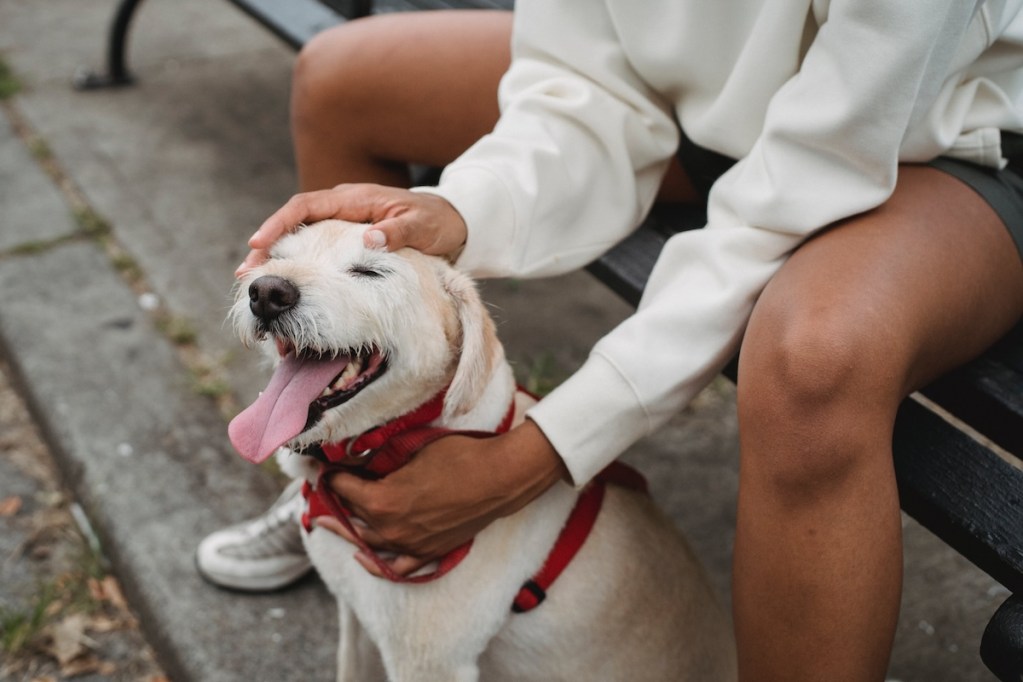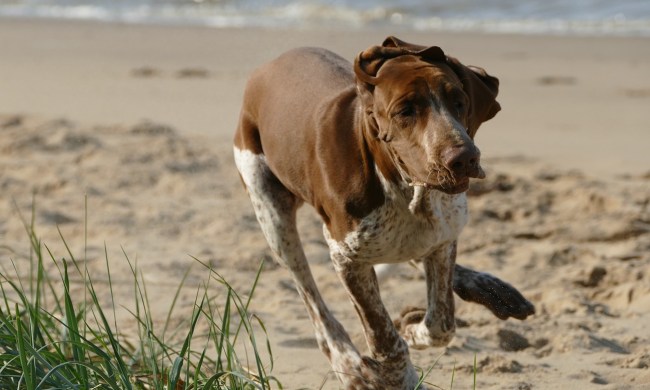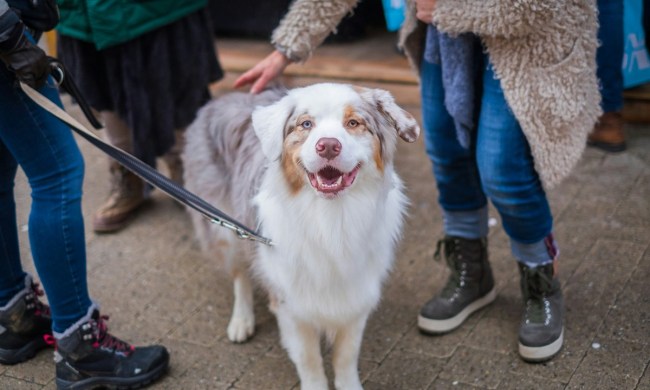
Most of us have suffered from a bout of the hiccups at least once, and while hiccuping can be annoying, it’s very rarely harmful. However, in some cases, hiccups can be a symptom of an underlying medical problem, such as pneumonia or pancreatitis. In very rare cases, hepatitis or liver cancer may cause hiccups.
This sounds scary, but does that mean you should be worried if your dog has hiccups? More often than not, your dog’s hiccups will resolve within a few hours, but if your pooch has difficulty eating, drinking, or sleeping because of his hiccups, it’s a good idea to take him to the vet. Here’s what you’ll want to know about canine hiccups.
What causes hiccups in dogs?

Just like in humans, a dog’s diaphragm expands and contracts with each inhale and exhale, moving up and down within the chest cavity. When the diaphragm spasms, hiccups occur — with or without that distinct ‘hic’ sound. Causes of hiccups in dogs include the following.
Stress
When dogs become stressed, excess cortisol floods their system, raising their heart rate. The combination of heightened cortisol levels and an increased heart rate causes irritation in the diaphragm, which can lead to hiccups.
Eating or drinking too quickly
If your dog is a chow hound at mealtime, that could be the reason he has hiccups. Eating and drinking too quickly cause your pup to swallow air along with food and water, leading to involuntary spasms in the diaphragm.
Gas
According to the American Kennel Club (AKC), hiccuping could be a dog’s way of alleviating a buildup of gas. Hiccuping with eating may be more commonly seen in puppies, but it isn’t a cause for alarm in adults either.
Eating spicy food
If your pup stole a bite of a spicy burrito, capsaicin could be the cause of his hiccups. Odds are, you’ve dealt with the consequences of spicy food before, too!
Excitement
Even an enjoyable play session can cause hiccups every now and then. As your dog romps through the yard, he may begin to take short, rapid breaths through his chest, bypassing the diaphragm. When this happens, your playful pooch may develop a case of hiccups. It should resolve as he settles down.
Certain medications
Some dogs require medications to treat acute or chronic conditions. Antibiotics (used to treat infections) and corticosteroids (commonly prescribed to treat allergies and asthma) may cause hiccups.
How can I treat my dog’s hiccups?

Your dog’s hiccups should resolve on their own within a few minutes. If they continue for several hours, you may need to offer some assistance. Here are a few methods you can use to help your dog get rid of his hiccups:
- Take your dog for a leisurely walk. Walking at a calm, steady pace can help change your dog’s breathing pattern, causing his diaphragm to relax and regulate itself.
- Give your dog some milk. For pups who’ve stolen a bite of spicy human food, milk is a fantastic hiccup cure. Casein, the main protein in milk, helps dissolve the capsaicin found in spicy foods, reducing the irritation causing your dog’s hiccups.
- Give your dog room-temperature water with a bit of honey. Honey can soothe an irritated throat, which might help calm those annoying spasms. Room-temperature water is less jarring to the system than cold water, and the act of swallowing may help relieve stress and excitement if your dog hiccups when he’s worked up.
- Try a belly rub. Having your pup lie on his back while you rub his belly helps his breathing return to its normal rhythm. You’ll also help your dog feel safe and content, which helps relieve stress-induced hiccups.
If none of these methods work, you’ll need to contact your vet.
When should I be worried about my dog’s hiccups?

For the most part, hiccups are caused by simple issues, such as eating too fast or playing a little too hard. However, hiccups may be a symptom of a more serious condition, such as:
Overheating
Brachycephalic (also known as flat-faced) breeds like bulldogs are prone to heatstroke. Try to limit the amount of time your dog spends outdoors in the heat, and take him to the vet immediately if you suspect heatstroke. Breathing abnormalities, including hiccups and gasping, can be common among flat-faced dogs experiencing hyperthermia.
Respiratory conditions
If your dog’s hiccups are accompanied by a runny nose, sneezing, or breathing difficulties, they could be a symptom of allergies, bronchitis, asthma, or pneumonia. This requires a vet visit to diagnose.
Digestive issues
Hiccups accompanied by digestive symptoms like vomiting or diarrhea could indicate a gastrointestinal condition like irritable bowel disease, or they could be a sign that your pup has a parasitic infection. Make sure your pooch is up-to-date on his vaccines to prevent parasites like roundworms. If symptoms persist, please visit the vet.
Are dog hiccups painful or scary?

Any dog owner would agree that hearing your dog gasp or squeak out of nowhere can be startling at best. Many pet parents rush their dogs to the vet during a severe bout of hiccups! While this may be necessary if hiccups are a result of asthma or overheating, you’ll be glad to know that most cases of hiccups sound a lot worse than they are.
If you can remember the last time you had hiccups, you may remember some discomfort in your chest. This is a normal side effect of diaphragm spasms, and although it can be slightly painful, it’s rarely cause for concern. Your dog may temporarily act off, but it shouldn’t be for long.
Final thoughts on dog hiccups

While puppies frequently get the hiccups, older dogs typically outgrow them. But that doesn’t mean you need to panic if your adult dog suddenly starts hiccuping. Most cases of hiccups will resolve on their own once your dog calms down. However, if your dog’s hiccups accompany other symptoms or last longer than a couple of hours, you should consider a visit to the vet.



